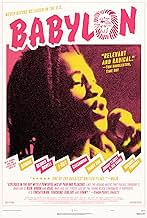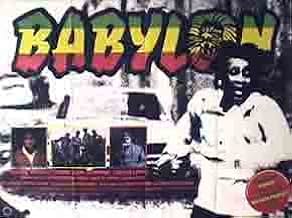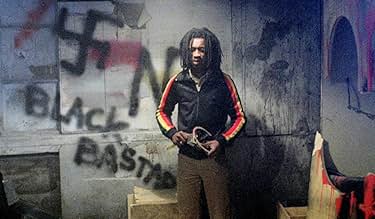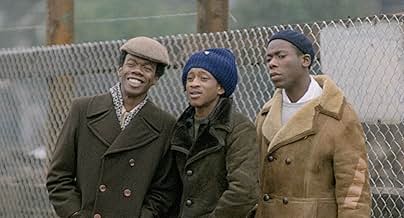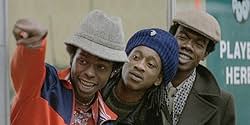Babylon
- 1980
- 1h 35min
CALIFICACIÓN DE IMDb
7.3/10
2.1 k
TU CALIFICACIÓN
Agrega una trama en tu idiomaThe movie centres around Brindsley Forde's character Blue. He fronts a reggae sound system based in South West London (Brixton). The film captures the trials and tribulations of young black ... Leer todoThe movie centres around Brindsley Forde's character Blue. He fronts a reggae sound system based in South West London (Brixton). The film captures the trials and tribulations of young black youths in troubled London in the early eighties.The movie centres around Brindsley Forde's character Blue. He fronts a reggae sound system based in South West London (Brixton). The film captures the trials and tribulations of young black youths in troubled London in the early eighties.
- Dirección
- Guionistas
- Elenco
Beverley Michaels
- Elaine
- (as Beverly Michaels)
T-Bone Wilson
- Wesley
- (as T.Bone Wilson)
- Dirección
- Guionistas
- Todo el elenco y el equipo
- Producción, taquilla y más en IMDbPro
Opiniones destacadas
As an avid follower of British cinema, I like to think that I've seen most of the worthwhile films that our country has produced. But I'm always on the lookout for films that I haven't seen, but sound interesting, and so I stumbled upon Babylon, then tracked it down on DVD and gave it a watch.
Co-written by the writer of Quadrophenia, and directed by an Italian born director, and starring Brinsley Forde of Aswad, comedian Mel Smith, and Karl Howman, perhaps best known these days as the face of Flash household cleaning products, it seems an unlikely sort of project, which perhaps, not surprisingly due to its sensitive subject matter dealing with the institutionalised racism of late 1970's England, seemed to receive little attention when it was released.
This is a shame, as although not quite a classic film, the director, Franco Rosso, who sadly was unable to generate funding for any future film projects after making this film, shows that given time he could have been a significant voice in British Cinema. Babylon is a film made by a gifted director just finding his feet, with some memorable scenes littered throughout. It strikingly portrays working class London in the late 1970's as a pretty unforgiving environment, though, the drab atmosphere of the setting is frequently punctuated by tracks from the film's reggae soundtrack, bringing you into the characters' world as they seek solace from these surroundings in the reggae music they play through their cherished sound system.
Babylon should definitely have a place in anyone's top 100 British films of all time. For me It only narrowly falls short of classic status because the ending feels a tad abrupt, and the whole film does feel like it does not run quite as seamlessly as it should. Perhaps that's down to the editing maybe. Even so, I'd recommend it to anyone with an interest in British films.
Co-written by the writer of Quadrophenia, and directed by an Italian born director, and starring Brinsley Forde of Aswad, comedian Mel Smith, and Karl Howman, perhaps best known these days as the face of Flash household cleaning products, it seems an unlikely sort of project, which perhaps, not surprisingly due to its sensitive subject matter dealing with the institutionalised racism of late 1970's England, seemed to receive little attention when it was released.
This is a shame, as although not quite a classic film, the director, Franco Rosso, who sadly was unable to generate funding for any future film projects after making this film, shows that given time he could have been a significant voice in British Cinema. Babylon is a film made by a gifted director just finding his feet, with some memorable scenes littered throughout. It strikingly portrays working class London in the late 1970's as a pretty unforgiving environment, though, the drab atmosphere of the setting is frequently punctuated by tracks from the film's reggae soundtrack, bringing you into the characters' world as they seek solace from these surroundings in the reggae music they play through their cherished sound system.
Babylon should definitely have a place in anyone's top 100 British films of all time. For me It only narrowly falls short of classic status because the ending feels a tad abrupt, and the whole film does feel like it does not run quite as seamlessly as it should. Perhaps that's down to the editing maybe. Even so, I'd recommend it to anyone with an interest in British films.
Thank Margaret Thatcher for "Babylon", a tale of several West Indian youths living in a dank and dreary Great Britain. She's not mentioned in the film, but she might as well be the Bible's fork-tongued Whore of Babylon. Her city? London, to which the film's title alludes (Rastafarians and Christians use the word "Babylon" to refer to a corrupt and decadent society).
"Babylon" was directed by Franco Rosso, and was late to a wave of British films revolving around West Indians living in South London. The first of these was Horace Ove's "Pressure", also the first British film to be directed by a black director. Like "Pressure", "Babylon" is a gritty, neorealist account of black Londeners, chief among whom is Blue (played by reggae vocalist Brinsley Forde), a Rastafarian disc jockey who's trying to prepare for an upcoming music competition. Like the characters in "Pressure", Blue struggles with crime, racism, prejudice, violent slum life, personal and racial identity and finds the only positive outlet in his life – his music – repeatedly challenged.
The inter-war and postwar (1944-1962) years saw a huge increase in Caribbean migrants arriving in Britain. The first of these were lured over to fight in World War 2 (tens of thousands of West Indians were recruited for service in the RAF and Royal Navy), work in industries and agriculture, all sectors which were facing serious labour shortages. These shortages were only partly met by the recruitment of women and Irish workers. During the long, post-war Eropean economic boom, which was fuelled by reconstruction and American investment, immigration then began to further increase, leading to the creation of substantial immigrant communities in and around London. This, of course, led to frictions with the white working class, which culminated in the riots of the 1950s, in which white gangs such as the Teddy Boys clashed with black immigrant families. Far right groups, unions and the left would all exploit these conflicts. "Pressure" and "Babylon", made in the late 1970s, were themselves released in the wake of a second wave of Nottingham riots.
Unlike most films in its wave, "Babylon" has a certain aesthetic punch (traces of "Saturday Night Fever"). The film is packed with smooth Reggae tunes and seems to take place in an everlasting night, with eye popping lights and fluorescent colours languishing behind a blanket of perpetual cigarette smoke. It's a moody, easy going film, captures well the London club scene of the 1970s, the brutalist hell of concrete-London, and offers a rare glimpse into the lives of an oft neglected community (black, West Indian South Londoners). On the flip-side, the film's writing is obvious and too direct, a trait typical of even classic neorealist works; what you see is what you get.
Uniquely, the film eschews Jamaican and West Indian gangland culture in favour for focusing on the implicit radicalism of reggae. Reggae always was protest music, its fire the fire of the mobs. It didn't quite last, though. Protest music declined in the early 1980s, with the deaths of Marley, Lennon and the slow collapse of punk. Reggae then essentially became stoner and sex music, as roots reggae transformed into dance-hall.
Before this, reggae was a force. The best reggae had the proselytising fury of Dylan, to which groups like Burning Spear, The Abyssinians or dub-poet Linton Johnson inserted their own Rastafarian or political beliefs. This "spiritual" dimension gave the genre a Utopian, almost philosophical tinge; the desire for change "through" music. Indeed, albums were oft given provocative titles like "Confrontation" and "Uprising", lyrics were openly agitprop ("Come we go chant down Babyon one mo' time!") and even album art would feature dread-locked warrior-heroes (the Rasta's dreadlocks were oft likened to the manes of the lion of Judah) slaying monstrous "Babylon Dragons". "Babylon" itself ends with a singer chanting "we can't take no more of that!", a protest which is inter-cut with shots of police officers kicking down doors (the film was banned because censors feared that it would incite riots). There's a simplicity to the film's politics - things boil down to a very simple, noir existentialism ("The city's not right and we want out!") - but also a sense of raw, truthful anger.
Horace Ove's "Pressure" is an even more interesting snapshot, thanks largely to its low budget, which necessitated the casting of many non actors. Trinidadian born Ove (pronounced "O-vay") was heavily influenced by Italian neorealists, and used heavy improvisation and cinema-verite techniques to convey life in 1970s West London. Like "Babylon" the focus is on young, black West Indians, most of whom are second generation migrants and all of whom struggle with issues of cultural identity, institutional racism and cultural preservation. The film's central character is a kid called Tony who is radicalised by his brother, a black activist. Much of the film deals with the problems of employment, alienation, white power structures, inextricable class/race linkages, and the assimilation or mutation of cultural values (the immigrant's changing taste in food, music, culture, beliefs etc). Some of the film's more daring moments align Christianity itself with racism, in which, for example, men of power use "black" as a metaphor for sin and tout "white" as being synonymous with holiness. Like many neorealist works, much of the film consists of "stolen footage", many of those appearing on screen not realising they are on camera or attending staged rallies. Like "Babylon", indeed like most neorealist works, "Pressure" has a certain obviousness about it. These films are best appreciated as time capsules; historical totem poles. In a sense, the mark the birth of Thatcherism. Thatcher, of course, was elected as leader of the Conservative party in 1975, and quickly set about removing certain safeguards for citizens in favour for an emphasis on "individual responsibility" and "private initiative", all the while presiding over the "managed decline" of several segments of society. She was good with code words.
8/10
"Babylon" was directed by Franco Rosso, and was late to a wave of British films revolving around West Indians living in South London. The first of these was Horace Ove's "Pressure", also the first British film to be directed by a black director. Like "Pressure", "Babylon" is a gritty, neorealist account of black Londeners, chief among whom is Blue (played by reggae vocalist Brinsley Forde), a Rastafarian disc jockey who's trying to prepare for an upcoming music competition. Like the characters in "Pressure", Blue struggles with crime, racism, prejudice, violent slum life, personal and racial identity and finds the only positive outlet in his life – his music – repeatedly challenged.
The inter-war and postwar (1944-1962) years saw a huge increase in Caribbean migrants arriving in Britain. The first of these were lured over to fight in World War 2 (tens of thousands of West Indians were recruited for service in the RAF and Royal Navy), work in industries and agriculture, all sectors which were facing serious labour shortages. These shortages were only partly met by the recruitment of women and Irish workers. During the long, post-war Eropean economic boom, which was fuelled by reconstruction and American investment, immigration then began to further increase, leading to the creation of substantial immigrant communities in and around London. This, of course, led to frictions with the white working class, which culminated in the riots of the 1950s, in which white gangs such as the Teddy Boys clashed with black immigrant families. Far right groups, unions and the left would all exploit these conflicts. "Pressure" and "Babylon", made in the late 1970s, were themselves released in the wake of a second wave of Nottingham riots.
Unlike most films in its wave, "Babylon" has a certain aesthetic punch (traces of "Saturday Night Fever"). The film is packed with smooth Reggae tunes and seems to take place in an everlasting night, with eye popping lights and fluorescent colours languishing behind a blanket of perpetual cigarette smoke. It's a moody, easy going film, captures well the London club scene of the 1970s, the brutalist hell of concrete-London, and offers a rare glimpse into the lives of an oft neglected community (black, West Indian South Londoners). On the flip-side, the film's writing is obvious and too direct, a trait typical of even classic neorealist works; what you see is what you get.
Uniquely, the film eschews Jamaican and West Indian gangland culture in favour for focusing on the implicit radicalism of reggae. Reggae always was protest music, its fire the fire of the mobs. It didn't quite last, though. Protest music declined in the early 1980s, with the deaths of Marley, Lennon and the slow collapse of punk. Reggae then essentially became stoner and sex music, as roots reggae transformed into dance-hall.
Before this, reggae was a force. The best reggae had the proselytising fury of Dylan, to which groups like Burning Spear, The Abyssinians or dub-poet Linton Johnson inserted their own Rastafarian or political beliefs. This "spiritual" dimension gave the genre a Utopian, almost philosophical tinge; the desire for change "through" music. Indeed, albums were oft given provocative titles like "Confrontation" and "Uprising", lyrics were openly agitprop ("Come we go chant down Babyon one mo' time!") and even album art would feature dread-locked warrior-heroes (the Rasta's dreadlocks were oft likened to the manes of the lion of Judah) slaying monstrous "Babylon Dragons". "Babylon" itself ends with a singer chanting "we can't take no more of that!", a protest which is inter-cut with shots of police officers kicking down doors (the film was banned because censors feared that it would incite riots). There's a simplicity to the film's politics - things boil down to a very simple, noir existentialism ("The city's not right and we want out!") - but also a sense of raw, truthful anger.
Horace Ove's "Pressure" is an even more interesting snapshot, thanks largely to its low budget, which necessitated the casting of many non actors. Trinidadian born Ove (pronounced "O-vay") was heavily influenced by Italian neorealists, and used heavy improvisation and cinema-verite techniques to convey life in 1970s West London. Like "Babylon" the focus is on young, black West Indians, most of whom are second generation migrants and all of whom struggle with issues of cultural identity, institutional racism and cultural preservation. The film's central character is a kid called Tony who is radicalised by his brother, a black activist. Much of the film deals with the problems of employment, alienation, white power structures, inextricable class/race linkages, and the assimilation or mutation of cultural values (the immigrant's changing taste in food, music, culture, beliefs etc). Some of the film's more daring moments align Christianity itself with racism, in which, for example, men of power use "black" as a metaphor for sin and tout "white" as being synonymous with holiness. Like many neorealist works, much of the film consists of "stolen footage", many of those appearing on screen not realising they are on camera or attending staged rallies. Like "Babylon", indeed like most neorealist works, "Pressure" has a certain obviousness about it. These films are best appreciated as time capsules; historical totem poles. In a sense, the mark the birth of Thatcherism. Thatcher, of course, was elected as leader of the Conservative party in 1975, and quickly set about removing certain safeguards for citizens in favour for an emphasis on "individual responsibility" and "private initiative", all the while presiding over the "managed decline" of several segments of society. She was good with code words.
8/10
Saw USA release in the theatre in Austin and it beat my hopes. Great soundtrack and a story that is still pertinent to today. Sad it took so long. Need this in more mediums.
10me-2075
This was a film of it's time, I am one of the lucky ones who saw it when it premiered the one and only time on Channel 4 back when it was a new station. It features great performances by most of the cast and outstanding ones from Brinsley Forde, Karl Howman & Trevor Laird. The soundtrack to the movie is excellent and also brings back some fond memories of what life was like back in that time. People not from the UK or who are not familiar with Brixton get a real eye opener about what life for black youths, but black young men in particular was like. The deprivation, the listlessness and the treatment by the police, treatment that led ultimately to the riots in ensuing years
I cannot understand why this film wasn't released on DVD, the 25th anniversary 2 years ago would seem to have been a great opportunity. Perhaps we need a petition on the .gov.uk site to implore the powers that be to set and keep the date for release!!!
Perhaps we should arrange a big screening somewhere in the west end. I highly recommend this film. Definitely one for the collection.
I cannot understand why this film wasn't released on DVD, the 25th anniversary 2 years ago would seem to have been a great opportunity. Perhaps we need a petition on the .gov.uk site to implore the powers that be to set and keep the date for release!!!
Perhaps we should arrange a big screening somewhere in the west end. I highly recommend this film. Definitely one for the collection.
A nostalgic picture of imagery backed by the raw realism the style captures - 70s and 80's in LDN. It's hilarious, sad at times with a pendulum of the good and bad moments city life had to offer in the build up to the Brixton riots in 1981. Highlighting the divide between culture and colour. A moving picture that's a brilliant insight into the history. The language spoken IsIyaric (pseudo-dialect of English consciously created by members of the Rastafari movement) warms to your ears as the film progresses so no need for subtitles.
A lesson for anyone wanting to get a glimpse of racism in the UK. It's shows how two wrongs dont make a right, and the wheel of revenge goes round in circles with no true winners.
The music masterclass which always seams to be ticking over in the background, ever changing and adapted for dark moments in the film keeps you intrigued. That's is my favourite thing about it. It reminds us that we should all love eachother equally regardless, because we are all trying to make are way in this world and a little reggae heals the soul. A World class film that disserves more recognition in the modern day. 10/10 will stay fondly in the memory as a cult classic.
A lesson for anyone wanting to get a glimpse of racism in the UK. It's shows how two wrongs dont make a right, and the wheel of revenge goes round in circles with no true winners.
The music masterclass which always seams to be ticking over in the background, ever changing and adapted for dark moments in the film keeps you intrigued. That's is my favourite thing about it. It reminds us that we should all love eachother equally regardless, because we are all trying to make are way in this world and a little reggae heals the soul. A World class film that disserves more recognition in the modern day. 10/10 will stay fondly in the memory as a cult classic.
¿Sabías que…?
- ErroresThis is likely to be a 'deliberate error by the film-makers', but in one scene you see two characters putting up a poster advertising a gig. The date shown is Saturday 23rd December (year unspecified). The nearest year that this date fell on was 1978, which is 2 years before the film was released. It is possible that various anachronisms in the film may occur due to this, for example release dates of records, or registration number plates of new cars.
- ConexionesReferences Alien, el octavo pasajero (1979)
- Bandas sonorasWarrior Charge
Performed by Aswad
Selecciones populares
Inicia sesión para calificar y agrega a la lista de videos para obtener recomendaciones personalizadas
- How long is Babylon?Con tecnología de Alexa
Detalles
Taquilla
- Total en EE. UU. y Canadá
- USD 109,749
- Fin de semana de estreno en EE. UU. y Canadá
- USD 21,214
- 10 mar 2019
- Total a nivel mundial
- USD 111,456
- Tiempo de ejecución1 hora 35 minutos
- Mezcla de sonido
- Relación de aspecto
- 1.85 : 1
Contribuir a esta página
Sugiere una edición o agrega el contenido que falta

Principales brechas de datos
By what name was Babylon (1980) officially released in India in English?
Responda


